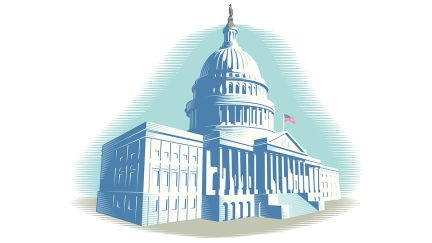Never miss a story — sign up for PLANADVISER newsletters to keep up on the latest retirement plan adviser news.
403(b) Plan Sponsors Continue to Improve Investment Oversight
Even among 403(b) plans not governed by ERISA, PLANSPONSOR DC Survey results show that in 2016, 54.3% of plan sponsors reported they have an investment committee for their plans; this jumped to 67.3% in 2017 and 67% in 2018.
Responses to the PLANSPONSOR Defined Contribution (DC) Survey over the past three years indicate that 403(b) plan sponsors are improving certain plan governance practices.
For Employee Retirement Income Security Act (ERISA)-governed 403(b) plans, the percentage using the services of a plan adviser or institutional investment consultant jumped from 59.2% in 2016 to 71.8% in 2017 and 73.3% in 2018. In 2016, 32% of 403(b) plan sponsors indicated their adviser acted as a 3(21) fiduciary investment consultant, and 16% reported their adviser acted as a 3(38) fiduciary investment manager to the plan. This compares to 45% and 14.4%, respectively, in 2017, and 47.9% and 16.6%, respectively, in 2018.
Overall, in 2016, more than three-fourths (76.6%) of ERISA 403(b) plans said they had an investment committee for their plan. The percentage grew to 86.1% in 2017 and 87.9% in 2018. In addition, the make-up of ERISA 403(b) plans’ investment committees has changed. In 2016, one-third of plan sponsors reported their investment committees included only internal employees, 4.6% said their committee including only people external to the company, and 39.1% indicated their committee included a mix of internal and external people. By 2018, this was 40.2%, 3.8% and 43.1%, respectively.
Nearly 73% of ERISA 403(b) plans reported having an investment policy statement (IPS) in 2016, about the same as in 2017. However, in 2018, nearly 80% of ERISA 403(b) plan sponsors said they had an IPS. From 2017 to 2018, the percentage of plan sponsors indicating their IPS covered target-date funds (TDFs) and their underlying funds grew from 59.6% to 62.2%.
In addition, the survey found that in 2017, 47.7% of ERISA 403(b) plan sponsors agreed or strongly agreed with the statement, “Our organization appropriately documents the reasoning behind changes to plan investments,” while in 2018, the percentage who agreed or strongly agreed with that statement jumped to 77.6%.
Non-ERISA 403(b)s
Even among 403(b) plans not governed by ERISA, PLANSPONSOR DC Survey results show improvement in certain governance practices.
In 2016, 54.3% of non-ERISA 403(b) plan sponsors reported they have an investment committee for their plans. This jumped to 67.3% in 2017 and 67% in 2018.
Half of non-ERISA plans indicated they had an investment policy statement in 2016, compared to around 60% in 2017 and 2018. From 2017 to 2018, the percentage of plan sponsors indicating their IPS covered target-date funds (TDFs) and their underlying funds grew from 54% to 66.2%.
In addition, in 2017, 48.2% of non-ERISA 403(b) plan sponsors agreed or strongly agreed with the statement, “Our organization appropriately documents the reasoning behind changes to plan investments,” while in 2018, the percentage who agreed or strongly agreed with that statement jumped to 65.5%.“Although some variation in results is to be expected in different years, our data suggests that 403(b) plan sponsors are improving plan governance,” says Brian O’Keefe, director of research and surveys at Strategic Insight, parent of PLANADVISER and PLANSPONSOR. “It is encouraging to see a wider range of plans, including both ERISA and non-ERISA plans, formalizing investment oversight policies and practices.”
You Might Also Like:

403(b) Plans Have Special Considerations When Complying with SECURE 2.0

House and Senate Reintroduce Bills to Permit CITs in 403(b) Plans
